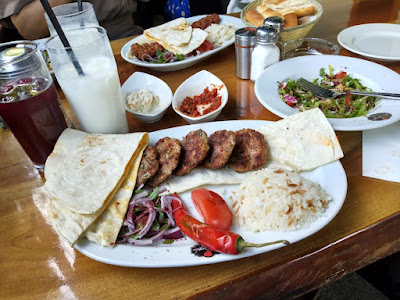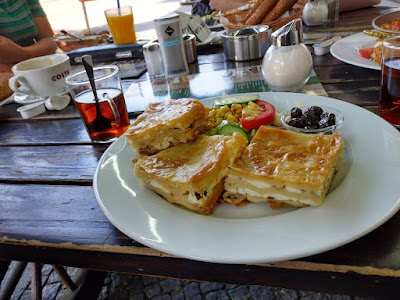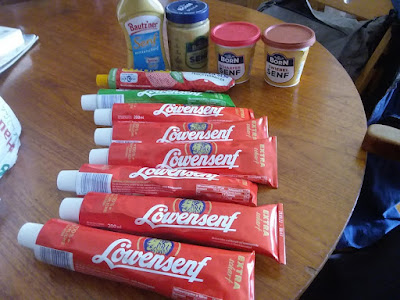June found us traveling around the Berlin vortex of the European Klezmer music world, a world in which Jewish traditional music comes in contact with two of my favorite things: Turkish food and Würst. Berlin has two iconic street foods: the Berlin doner kebab and the curry wurst. I managed to not eat either of them. I have eaten curry wurst, many curry wursts... and I don't like curry wurst, which is basically a wurst with ketchup and curry powder or some hausgemakht version of the same. I like my bratwursts clean, hot, and straight off the grill.
 |
| Bratwurst, Leipzig, Mozart ate these. |
I especially do not enjoy the post WWII east German invention of the "ohne darm" skinless bratwurst such as those served by the famous Konnopke's Imbiss in Prenslauerberg. One stop up the Ubahn at Schönhauser Allee is the nostalgic East German Alain Snack kiosk, which provided the classic bratwurst and mustard seen above. It was so good I tried to get a bockwurst (more like a fat Katz's Deli frankfurter that went to heaven) in a bun with mustard but the chef objected to the mere thought: the Ketwurst was designed by the East German State Gastronomical Research Center to provide the communist workers of Berlin with a convenient snack.
.jpg) |
| The stupidest food I have ever posted. |
A Ketwurst is basically a hot dog (in this case a pretty darn good bockwurst) stuck in a bun heated on a toaster spike which has been filled with "special sauce" (i.e., ketchup.) It is an unmistakably East Berlin nostalgia flavor and it is an incredibly stupid food in a country known for incredibly stupid food. East Germans didn't simply melt into a post 1990 German" identity: a lot of them cling fiercely to the small things that once defined them as Ossies... like Ketwurst!
Bockwurst is the one item I always bring home with me after visiting Berlin. For some odd reason, Hungarians - who love German sausages - do not produce anything nearly as good. Only the Czech and Slovak supermarket parky rivals the Hungarian virsli for lowest place on the frankfurter quality index (as defined by snap of skin, texture of mystery meat filling, and rate at which it dries out into a wrinkled turd in your fridge.) So all available space in my home bound luggage is filled with bockwurst. Did I mention that Berlin is probably also the most vegan -friendly city in Europe? Yes, it indeed is. As if I could give a shit.
The other thing I bring home is mustard. The mustard available in Hungary does almost nothing beyond stain your white T-shirt yellow. Somehow people in Eastern Europe fucked up mustard. I don't know how, they just did. So I bring it back from my trips to Germany, in particular the Dusseldorf brand Lowensenf, which beats any French Dijon mustard for making sauces or just dipping hot dogs into. We picked up a bit of the Bautz'ner brand, which we tried in Leipzig, and while in Erfurt we picked up some of their local "Born" brand, which is good but definately a classic "Ostbloc" mustard. Erfurt has a beautiful old town that seems to go a bit overboard about their mustard industry. There is a Mustard Museum downtown, and I was even given a gift bottle of "Born Mustard Brandy". It was truly vile, but it is the thought that counts.
Berlin is easily the city where a visitor can spend less and eat better than almost any other European capitol. There are other things to eat in Berlin besides Turkish food and sausage, but trust me: they suck. I don't use the term "suck" to simply indicate lesser quality... I mean "Whoa! That sucks!" Most of the nicer places specialize in what we ex-kitchen staff know as "pretentious tweezer food". Another problem is that Germans can not eat spicy food. That is not a stereotype." If a German unexpectedly encounters a blast of hot pepper they can - and sometimes do - sue the restaurant. So the smart chef dumbs everything down: watery stocks pass as pho, bland plates of noodles with peanuts sprinkled on top are labeled "pad thai" alongside menu categories identified as "Asia Wok" and of course, "China Box". There are hundreds of these "pan-asian" monstrosities all over Germany. The late Ed Ward - one of the best American expat writers ever to set foot in Europe took umbrage at the easy racism that powers this perception that all "Asian" food is the same It's undeniable, though, that this sort of racism -- Orientalism, to give it its proper name -- is acceptable here. There's a snack food that comes in "Thailandische süss-scharf" (sweet-hot) flavor, and features a "Thai" on the package wearing a coolie hat, slanty eyes, a pigtail, and those kind of Japanese wooden shoes with the two platforms, the kind that geishas wear. It's an offensive stereotype, but it isn't even a remotely accurate offensive stererotype.
 |
| Köfte |
On the other hand, Berlin has glorious Turkish food. Most of the Turks living in Germany today have Anatolian roots, and also something very few people in Anatolia have: a decent income. And it shows in the restaurants in neighborhoods like Wedding. Wedding has the lowest income level and the highest percentage of foreign born residents in all of Berlin. That may sound like something out of a Viktor Orban fever dream, but it is one of the more pleasant parts of Berlin, especially if you have an appetite. We randomly chose Köyluoglu Turkish Restaurant in Wedding and it was one of the best restaurant meals we've had in years. I was converted to köfte (roughly: meatwads) years ago in Istanbul: Fumie always goes for Adana kebab. Either way, nobody understands ground meat better than a Turkish kitchen. I have spent decades trying to make a decent Turkish style köfte in my home, and only recently had any success in producing something that does not resemble a small dried hamburger. Good köfte proves the rule that simplicity can be deceiving. Köfte is rapidly replacing doner as the King of Turkish street meat on Berlin's streets.
 |
| Köfte sandwich at Gel Gör |
Later, after rehearsing in Neukölln, I had late lunch at Gel Gör, a grill famous for its inegol köfte and that stays open all night long and is famous for impromptu street dancing at 4 AM on weekends. This rates as the best sandwich of the year so far, considering that I have not been able to visit Katz' Deli this year. And just down Kottbusser Damm on the next corner was La Femme, specializing in Turkish breakfast. There is a saying in Turkish (I am not making this up) that "lunch is for your friends, dinner is for your family, but breakfast is just for you." Omelets, cheese and olive plates, perfect for wasting a morning outside with your friends. I even ordered a breakfast to go on a travel day, only to offer it in sacrifice it to our unfed cimbalom player who was driving us to our next gig.
 |
| Su burek: think non-tomato lasagna for breakfast. |
On the upside, the music - with Craig Judelman's Klezmer Kompanye - was great. With Craig and Zoe Aqua on fiddle, Shaun Williams on accordion and cimbalom, and Dasha Fomina on flute. We played the Panda Platform in P-berg, Berlin, and it was like a homecoming for all kinds of Yiddish friends and klezmerei... Michael Wex, Shane Baker, Tamas Wormser were all in the house. The road always leads home.





4 comments:
The mustard that was designed to stain white T-shirts is French’s. Proper Hungarian Glóbusz mustár is just a mild vinegary mustard designed to stand up to heavy garlicky sausages. It is not terribly complex but works very well with Hungarian type sausages.
Answer #1: Hungarian sausages are heavily oversalted, so the mustard tends to be bland. Try making a vinaigrette dressing with Globus. Answer #2: they used to include "German Chinese Food" in the chinese cooking course taught at Culinary Institute of America in Poughkeepsie, NY... basically fried bits of meat in thick gravy. but compared to the rest of Germany Berlin does actually have some decent Chinese food, at least Beijing style dumplings in P-Berg and some decent noodle places, and a string of real Chinese joints along Kantstrasse.
Excellent piece, as always....
Colman's English mustard beats 'em all!
Post a Comment